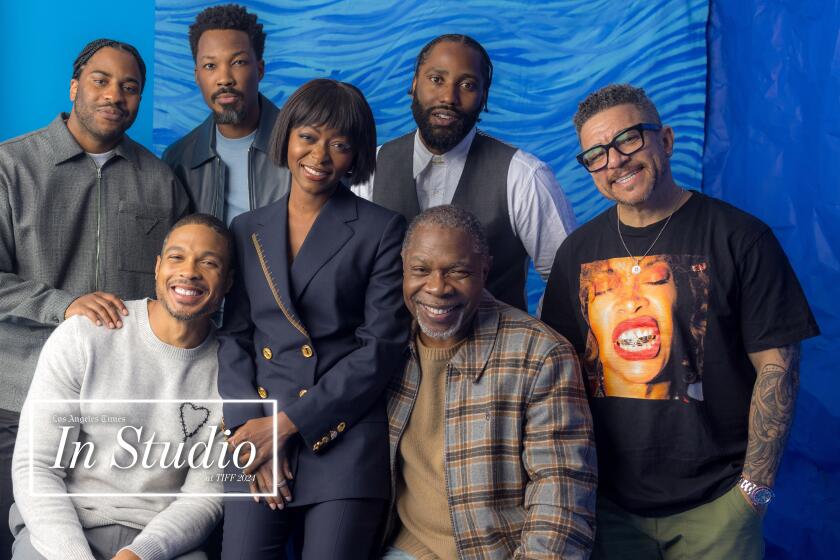
John David Washington spent four months playing Boy Willie in the recent Broadway production of August Wilson’s “The Piano Lesson.” Acting opposite Samuel L. Jackson, who originated the role in 1987, Washington channeled aspects of his Southern family members — such as his Uncle Woodson from North Carolina — to pace the boards as a charismatically intense, proud farmer from Mississippi with the gift of gab.
It was his first stage production as a professional actor, and “I’ve never been so anxious and nervous about something,” Washington says. “Opening night’s supposed to be this great night, and it’s magical. ... I hated it.”
He remembers when his kid brother, Malcolm, came backstage: “I don’t know how he snuck into my dressing room, and he just gave me a hug, like, ‘Go get ’em, man!’ And it was funny. I laughed to myself: How did this Negro get up here? But also, I love how calm and cool he is. Meanwhile, I’m going crazy! I’m hella nervous.”
It took Washington a month to stop carrying the intensity of the performance with him throughout the day, every day, but in the end, “It was a life-changing experience,” he says. “I can’t wait to go back onstage.”
When that same little brother decided to make his directorial debut with an adaptation of the same play for Netflix, Washington had about four months between closing night onstage and the first day of shooting. He had every line baked into his brain, but now he had to “break, or I guess sort of unlearn what I learned a little bit,” he says, “because of the different responsibilities from the play to the movie.”

In the play, “We were always talking about amplifying August Wilson’s words,” whereas in the film, “I got to really home in on the behavior of Boy Willie. And just because we’re not saying all the lines — a lot of stuff was cut — doesn’t mean that it’s not useful. Now some of those big monologues might be reduced, but those words I just put even more in the behavior. Now I can put that even more in how I listen and interact with my scene partners — without the words.”
The whole production was a family affair: Washington’s father, Denzel, was a producer along with his sister, Katia. Malcolm is seven years younger than John David, who turned 40 earlier this year — but Washington says he consciously made himself an actor for hire.
“It wasn’t about my brother — it was more about this director that I really love,” Washington says. “Because I respect him so much, I stayed out of the way. ‘Yes sir. No sir. You need me there what time? I got it.’”


(Christina House/Los Angeles Times)
Malcolm Washington liberated the play from its theatrical box by painting dramatically vivid and stylistic flashbacks and montages, by using fluid camerawork and choice reaction shots, and by accentuating the story’s supernatural elements of ghosts both vengeful and benevolent.
Malcolm says that looking at his brother through the camera lens changed the way he saw him.
“An older sibling, you look up to them in ways, even if there’s conflict,” says Malcolm. “They’re like your snapshot into the future. So I’ve always been looking up to him, but in a lot of ways not really seeing him.”
A director’s job is so much about observation, “and just looking, and watching, and seeing,” he explains, “and you’re just staring in the monitor looking at what an actor is giving you, and trying to be connected to what they’re doing.” That’s how he began to see in his brother “somebody that had this great sweetness inside of him. I think that was what made his portrayal of Boy Willie really special to me,” he says. “There was so much hurt and softness and sweetness ... and in that way, I saw all of those things in him in a different kind of way.”
Two years ago, the actor found herself in an Oscars controversy after being snubbed for ‘Till.’ Now she returns with ‘Piano Lesson’ — and awards watchers predict payback.
John David sees Boy Willie as a man who loves his father and grandfather, “but he’s also going to be nothing like them,” the actor says. “He is relentless in his pursuit of the American Dream.” He adds: “I think what drives him is that he’s his own person. He’s evolved. He’s the new way of being — as an American, not just an African American.”

Boy Willie comes storming into Pittsburgh, smiling and laughing but on a mission: to sell that family piano so he can buy his own land back in Mississippi.
“This is a man who doesn’t fear death,” the actor says, “in fact, conquers it and thinks he can command it, he can control it. So there might be even an arrogance — but that arrogance is birthed off of what he’s lost and what he’s experienced in his life.”
That fearlessness is evident in Washington’s performance too — charming, boisterous and musical, but in the character’s bookend moments, serene and almost childlike.
“That’s why I love this play,” Washington says. “There are so many opportunities as an actor to explore the human condition, in so many ways.”
More to Read
From the Oscars to the Emmys.
Get the Envelope newsletter for exclusive awards season coverage, behind-the-scenes stories from the Envelope podcast and columnist Glenn Whipp’s must-read analysis.
You may occasionally receive promotional content from the Los Angeles Times.












